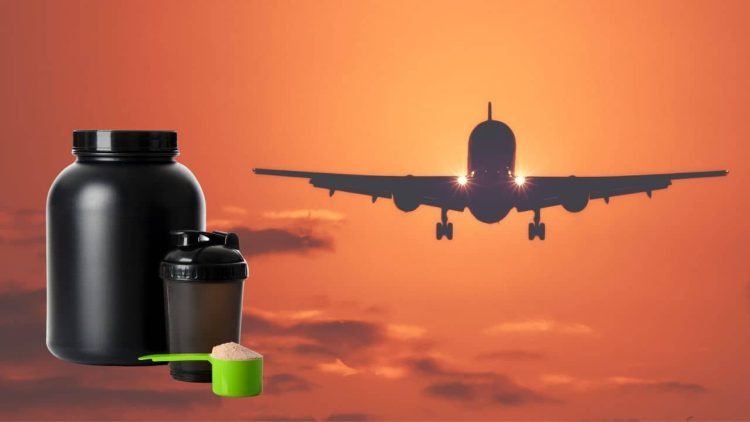Navigating the Skies: The Ins and Outs of Bringing Protein on Airplanes”

Traveling by air is a convenient and efficient way to reach our destinations, but the rules and regulations surrounding what can and cannot be brought on airplanes can sometimes be confusing. One common question that many passengers have is whether protein is allowed on airplanes. In this article, we will delve into the intricacies of bringing protein on board, exploring the guidelines set by airlines and aviation authorities to help you navigate the skies with confidence.
Understanding Airline Policies:
Each airline may have its own set of rules regarding the transportation of food items, including protein-rich snacks and supplements. It’s crucial to familiarize yourself with the specific policies of the airline you are flying with to avoid any last-minute surprises at the airport security checkpoint.
Generally, most airlines permit passengers to bring solid food items on board, including those containing protein. This could include items like granola bars, nuts, jerky, and protein bars. However, liquids and gels may be subject to stricter regulations, which we will explore further.
Security Screening:
When passing through airport security, all passengers are required to adhere to the Transportation Security Administration (TSA) guidelines in the United States or the equivalent authority’s rules in other countries. In terms of protein, solid food items typically pass through security without issue. However, liquids and gels, such as protein shakes or drinks, are subject to the 3-1-1 rule.
The 3-1-1 rule stipulates that liquids and gels must be in containers of 3.4 ounces (100 milliliters) or less, all containers must fit in a quart-sized, clear, resealable plastic bag, and each passenger is allowed only one bag. Therefore, if your protein supplement is in liquid form, it’s crucial to ensure it complies with these restrictions.
Packaging and Labeling:
To avoid unnecessary complications at the security checkpoint, it’s advisable to pack protein-rich items in their original packaging or in containers that clearly display the product’s information. This not only helps security personnel identify the contents easily but also ensures that you have the necessary details in case any questions arise.
Additionally, if you’re carrying protein powders or supplements, consider labeling them accurately. Some passengers find it helpful to carry a copy of the product’s nutritional information or ingredient list, especially if the packaging is not transparent or if the supplement is in a homemade container.
Special Considerations for International Travel:
For those embarking on international flights, it’s essential to be aware of the customs and regulations of the destination country. While the TSA guidelines apply to departing flights from the United States, the rules upon arrival may vary. Certain countries have strict regulations on bringing in food items, and protein products could be subject to scrutiny.
Researching the specific customs regulations of your destination will help you avoid potential issues upon arrival. Some countries may require additional documentation or have restrictions on certain types of protein products, so it’s wise to plan ahead and stay informed.
In-Flight Meal Options:
While bringing your protein snacks is a convenient option, many airlines also offer in-flight meals that cater to various dietary preferences, including high-protein options. If you have specific dietary requirements, such as a need for extra protein, it’s advisable to check with the airline in advance to see if they can accommodate your needs.
Some airlines allow passengers to pre-order special meals, including those that are high in protein or tailored to specific dietary restrictions. Taking advantage of these services can ensure that you have suitable food options during your flight.
Conclusion:
In conclusion, bringing protein on airplanes is generally allowed, but it’s essential to be mindful of the specific rules and regulations set by the airline and relevant aviation authorities. Understanding the guidelines for both domestic and international flights, as well as being aware of the security screening processes, will help you travel smoothly and enjoy your protein-rich snacks without any hiccups.
As with any aspect of air travel, preparation is key. Pack your protein items thoughtfully, adhere to the security regulations, and, if needed, communicate with the airline beforehand to ensure a comfortable and satisfying journey. By staying informed and following the guidelines, you can navigate the skies with your protein-packed essentials and focus on reaching your destination stress-free.
. Are protein-rich foods allowed on airplanes?
- Generally, yes. Most airlines permit passengers to bring solid food items, including those high in protein, on board. However, it’s essential to be aware of specific airline policies.
Can I bring protein supplements on a flight?
- Yes, you can bring protein supplements on a flight. However, there are considerations regarding the form (liquid or powder) and packaging. Liquids must adhere to the 3-1-1 rule, and powders should be properly labeled.
What is the 3-1-1 rule for liquids, and how does it apply to protein shakes?
- The 3-1-1 rule stipulates that liquids and gels must be in containers of 3.4 ounces (100 milliliters) or less, fit in a quart-sized, clear, resealable plastic bag, and each passenger is allowed only one bag. Protein shakes in liquid form must comply with these restrictions.
Are there restrictions on homemade protein snacks?
- While solid homemade protein snacks are generally allowed, it’s advisable to pack them in transparent or labeled containers to facilitate security checks. Being transparent about the contents can help avoid any unnecessary delays.
Are there any specific regulations for international flights?
- Yes, regulations may vary for international flights. It’s crucial to research and understand the customs regulations of the destination country. Some countries have strict rules regarding the import of food items, including protein products.
Can I bring protein bars in my carry-on luggage?
- Yes, protein bars are typically allowed in carry-on luggage. Ensure they are packed in a way that makes them easily identifiable during security checks to expedite the screening process.
Can I pre-order high-protein meals for my flight?
- Many airlines offer special meal options, including those that are high in protein. Passengers with specific dietary requirements can often pre-order these meals. Contact the airline in advance to inquire about available options.
Do I need to declare protein supplements at customs upon arrival?
- In some cases, especially for international flights, customs may require declarations for food items, including protein supplements. Research and understand the customs regulations of the destination country and be prepared to provide necessary information if required.
Are there any protein restrictions for passengers with dietary needs?
- Airlines often accommodate passengers with specific dietary needs, including those requiring extra protein. Check with the airline in advance to inquire about available options and whether they can meet your dietary requirements.
Can I bring frozen protein items in my carry-on bag? – Frozen items may be subject to additional security screening. It’s advisable to check with the airline regarding their policies on carrying frozen items in your carry-on bag.
Remember, while these answers provide general guidance, it’s crucial to check with the specific airline you are flying with, as policies may vary. Stay informed, plan ahead, and adhere to regulations to ensure a smooth travel experience with your protein-packed essentials.






